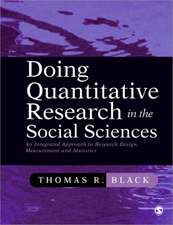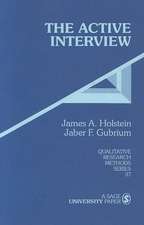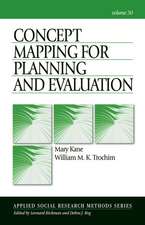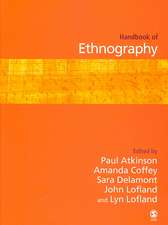The Ethnographic Self: Fieldwork and the Representation of Identity
Autor Amanda Coffeyen Limba Engleză Paperback – 9 mar 1999
Preț: 489.42 lei
Preț vechi: 575.78 lei
-15% Nou
Puncte Express: 734
Preț estimativ în valută:
93.65€ • 98.03$ • 77.95£
93.65€ • 98.03$ • 77.95£
Carte tipărită la comandă
Livrare economică 31 martie-14 aprilie
Preluare comenzi: 021 569.72.76
Specificații
ISBN-13: 9780761952671
ISBN-10: 0761952675
Pagini: 192
Dimensiuni: 156 x 234 x 11 mm
Greutate: 0.3 kg
Ediția:1
Editura: SAGE Publications
Colecția Sage Publications Ltd
Locul publicării:London, United Kingdom
ISBN-10: 0761952675
Pagini: 192
Dimensiuni: 156 x 234 x 11 mm
Greutate: 0.3 kg
Ediția:1
Editura: SAGE Publications
Colecția Sage Publications Ltd
Locul publicării:London, United Kingdom
Recenzii
`Whether you are contemplating ethnographic research, have already done it or are primarily interested in it as a reader, this book should deepen your appreciation of one of the most challenging activities that any social scientist or management research can engage in' - Management Learning
`The chapter entitled "The sex(ual) field" is a good example of how challenging Coffey's work is. She considers how the sexual status of the researcher can make a difference to the research; what the implications are surrounding physical sexual activity occurring during fieldwork; as well as fieldwork conducted in explicitly erotic settings. By considering this most personal of arenas, Coffey highlights the existence and participation of the researcher as a whole in the ethnographic research process....The Ethnographic Self is a useful reminder of the ways in which real people are involved in social research' - British Educational Research Journal
`The chapter entitled "The sex(ual) field" is a good example of how challenging Coffey's work is. She considers how the sexual status of the researcher can make a difference to the research; what the implications are surrounding physical sexual activity occurring during fieldwork; as well as fieldwork conducted in explicitly erotic settings. By considering this most personal of arenas, Coffey highlights the existence and participation of the researcher as a whole in the ethnographic research process....The Ethnographic Self is a useful reminder of the ways in which real people are involved in social research' - British Educational Research Journal
Cuprins
Introduction
Locating the Self
The Interpersonal Field
The Embodiment of Fieldwork
The Sex(ual) Field
Romancing the Field
Writing the Self
(Re)Presenting the Field
Consequences and Commitments
Locating the Self
The Interpersonal Field
The Embodiment of Fieldwork
The Sex(ual) Field
Romancing the Field
Writing the Self
(Re)Presenting the Field
Consequences and Commitments
Notă biografică
My research interests are underpinned by a sustained, critical methodological engagement with ethnographic and qualitative research. This includes work on contemporary developments in qualitative data analysis, writing and representation, as well as a focus on of the self and (auto)biography in qualitative inquiry. I have led and been involved in a number of funded projects focussing on qualitative research methods and methodological development. I am currently the Director of the Cardiff Node of the ESRC National Centre for Research Methods (NCRM) Qualitative Research Methods in the Social Sciences: Innovation, Integration and Impact (QUALITI) (2005-8).
Descriere
What are the relationships between the self and fieldwork? How do personal, emotional and identity issues impact upon working in the field?
This book argues that ethnographers, and others involved in fieldwork, should be aware of how fieldwork research and ethnographic writing construct, reproduce and implicate selves, relationships and personal identities. All too often research methods texts remain relatively silent about the ways in which fieldwork affects us and we affect the field. The book attempts to synthesize accounts of the personal experience of ethnography. In doing so, the author makes sense of the process of fieldwork research as a set of practical, intellectual and emotional accomplishments. The book is










